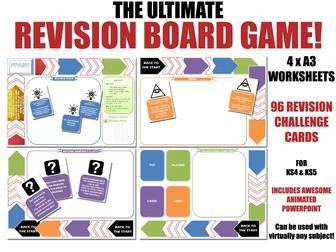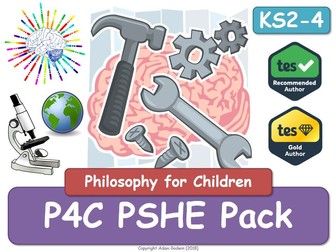Personal Safety & Staying Safe PSHE Session [P4C PSHE] (PSE, SPHE, PSED)
<p>The topic of this Philosophy Boxes download is ‘Personal Safety’. It is one of a series of PSHE-P4C sessions designed for KS2-4 PSHE students. The download comprises a P4C lesson/session that can be used multiple times with the same group.</p>
<p>The Philosophy Boxes Method is a new approach to PSHE designed for students in KS2-4: it is graphically stimulating, engaging, and fun. This download is also suitable for older students: but the format was designed with younger students in mind. In this context: ‘Philosophy Boxes’ represents a more student-centred ‘debate & discussion’ approach to PSHE issues.</p>
<p>The aim of our ‘Philosopy Boxes’ PSHE sessions is to bring deep, critical thinking to PSHE, exploring PSHE using P4C (Philosophy for Children) debates and discussions. One advantage to the method is that it helps students to practice their social skills through the activities.</p>
<p>The Philosophy Boxes Method presents students with a set of ‘mystery boxes’, when a student selects one of the boxes they are presented with 1 of 21 discussion/debate activities (in 8 different formats).</p>
<p>The presentation has integrated AfL so that teachers can test knowledge at any point in the lesson. There are 10 different AfL slides to choose from.</p>
<p>The design is colourful, animated, fun and engaging: all activities require movement and teachers can decide whether students are expressing their ideas purely verbally or by using post-it notes.</p>
<p>The nature of the design is that it can be used for short sessions (5-10 minutes) or much longer sessions (up to 2 hours!) - it allows for classroom practitioners to be flexible and adaptable. It can, therefore, be used in lessons or as a tutor-time activity.</p>
<p>Choose from out complete selection of our ‘Philosophy Boxes’ PSHE lessons <a href="https://www.tes.com/resources/search/?q=godwin86%20pshe">here.</a></p>
<p>You can also save money by purchasing lessons as a complete 20-session collection <a href="https://www.tes.com/teaching-resource/ks1-and-ks2-pshe-20-x-full-sessions-complete-set-high-quality-philosophy-boxes-method-p4c-smsc-body-changes-growing-up-puberty-community-citizenship-conflict-mediation-and-resolution-differences-and-similarities-e-safety-and-cyberbullying-emotional-wellbeing-and-mental-health-family-friends-financial-awareness-and-managing-money-jobs-cereers-healthy-living-harmful-substances-moral-and-spiritual-development-smsc-identity-and-awarenss-a-p4c-debates-and-discussion-approach-to-ks1-ks2-pshe-11508397">here</a>!</p>
![Personal Safety & Staying Safe PSHE Session [P4C PSHE] (PSE, SPHE, PSED)](https://l.imgt.es/resource-preview-imgs/0b59dd41-2097-46b7-a31c-4da9f5d5438a%2FNewCover2018PSHESingles.crop_960x717_0%2C0.preview.jpg?profile=res-img-med-legacy-v2)
![Citizenship "What does it mean to be a good citizen?" [Philosophy Boxes] KS1-3 (P4C) PSHE SMSC Tutor](https://l.imgt.es/resource-preview-imgs/865a1277-ff77-4549-bf71-682415ad333f%2FNewCover2018SinglePhilosophyForChildrenP4CLessonLessonsResourcesSessionsPhilosophyBoxes.crop_960x717_0%2C0.preview.jpg?profile=res-img-med-legacy-v2)
![19 x PSHE Sessions - Master Pack [Make your own PHILOSOPHY BOXES sessions!]](https://l.imgt.es/resource-preview-imgs/cde72112-a441-4d1d-a30f-14eba0205bb1%2FNewCover2018PSHE.crop_957x720_0%2C0.preview.jpg?profile=res-img-med-legacy-v2)
![Citizenship - Easter Quiz! GCSE KS4 [ PSHE, Citizenship, Quiz, Easter]](https://l.imgt.es/resource-preview-imgs/52218b89-70f6-4028-8135-ae19fc1301e6%2FCover.jpg?profile=res-img-med-legacy-v2)
![PSHE PSE PSHE [Video Learning Pack] PSHE](https://l.imgt.es/resource-preview-imgs/46ce8b90-4694-491d-acb4-b681885a7c54%2FOOPSHEPSHEPSHEPSESMSCPSHEGCSEKS4KS5KS3videoLearningPackCoverScienceChemistryBiologyPhysicsResourceResourcesTesVideoDocumentaryLessonWorksheet.crop_959x720_0%2C0.preview.jpg?profile=res-img-med-legacy-v2)
![Global Citizenship PSHE Session [P4C PSHE]](https://l.imgt.es/resource-preview-imgs/4bf3d303-3c8e-4443-bbea-980afe7f6d3f%2FNewCover2018PSHESingles.crop_960x717_0%2C0.preview.jpg?profile=res-img-med-legacy-v2)
![E-Safety & Cyberbullying - PSHE Session [P4C PSHE] (Social Media, Cyber Bullying, Safety, Computer)](https://l.imgt.es/resource-preview-imgs/758fcc5d-1a7d-46e2-89e3-27c3586a2d49%2FNewCover2018PSHESingles.crop_960x717_0%2C0.preview.jpg?profile=res-img-med-legacy-v2)
![Bullying, Exclusion & Friendship [Philosophy Boxes] KS1-3 (P4C) PSHE Tutor SMSC](https://l.imgt.es/resource-preview-imgs/46a86a17-b992-4bd8-9a0a-171b22a9f305%2FNewCover2018SinglePhilosophyForChildrenP4CLessonLessonsResourcesSessionsPhilosophyBoxes.crop_960x717_0%2C0.preview.jpg?profile=res-img-med-legacy-v2)


![Community & Citizenship PSHE Session [P4C PSHE, PSE]](https://l.imgt.es/resource-preview-imgs/b57ae272-e42e-43c5-8651-e293807ed283%2FNewCover2018PSHESingles.crop_960x717_0%2C0.preview.jpg?profile=res-img-med-legacy-v2)
![Respecting Differences - PSHE Session [P4C PSHE] (X)](https://l.imgt.es/resource-preview-imgs/a24dd12d-f08c-4397-9808-108470a74baf%2FNewCover2018PSHEcrop_957x720_00preview.crop_955x719_0%2C1.preview.jpg?profile=res-img-med-legacy-v2)
![Rights & Responsibilities PSHE Session [P4C PSHE PSE Citizenship]](https://l.imgt.es/resource-preview-imgs/2ab47eb1-4386-4e71-8963-dec775dd259e%2FNewCover2018PSHESingles.crop_960x717_0%2C0.preview.jpg?profile=res-img-med-legacy-v2)
![Differences & Similarities PSHE Session [P4C PSHE] (Diversity, Multiculturalism, Equality)](https://l.imgt.es/resource-preview-imgs/6bfd8eb0-b262-4327-a690-84546f41576e%2FNewCover2018PSHESingles.crop_960x717_0%2C0.preview.jpg?profile=res-img-med-legacy-v2)
![Moral & Spiritual Development - PSHE [P4C Session] (PSHE, P4C, Ethics, Ethical) (PSE, SPHE, PSED)](https://l.imgt.es/resource-preview-imgs/5e8fc198-79ae-4c36-975b-0993000db05a%2FNewCover2018PSHESingles.crop_960x717_0%2C0.preview.jpg?profile=res-img-med-legacy-v2)
![Emotional Well-being & Mental Health PSHE Session [P4C Approach] (PSHE, P4C) (Depression, Anxiety)](https://l.imgt.es/resource-preview-imgs/84a91dcc-3400-4fac-b6db-4c9c72506b39%2FNewCover2018PSHESingles.crop_960x717_0%2C0.preview.jpg?profile=res-img-med-legacy-v2)
![PSHE Silent Debate Activity (Form time/tutor time/PSHE sessions ) [PSHEE / PSE / PSHCE / PSED]](https://l.imgt.es/resource-preview-imgs/7659a5a2-6828-4212-a5de-108f540f35ef%2FCover3.jpg?profile=res-img-med-legacy-v2)
![Jobs, Careers & Work PSHE Session [P4C PSHE] (Career, Automation, Employment) (PSE, SPHE, PSED)](https://l.imgt.es/resource-preview-imgs/564dd9e9-5f31-4624-ba34-9b8471853f91%2FNewCover2018PSHESingles.crop_960x717_0%2C0.preview.jpg?profile=res-img-med-legacy-v2)
![Healthy Living - PSHE Session [P4C PSHE] (Health) (PSE, SPHE, PSED)](https://l.imgt.es/resource-preview-imgs/460ca405-2700-4f88-bba4-fe7563a155f9%2FNewCover2018PSHESingles.crop_960x717_0%2C0.preview.jpg?profile=res-img-med-legacy-v2)
![Bullying PSHE Session [P4C PSHE] (Bullying, Bullies) (PSE, SPHE, PSED)](https://l.imgt.es/resource-preview-imgs/ea4cf5e7-6ea9-4ab5-aa2d-047d877f5535%2FNewCover2018PSHESingles.crop_960x717_0%2C0.preview.jpg?profile=res-img-med-legacy-v2)